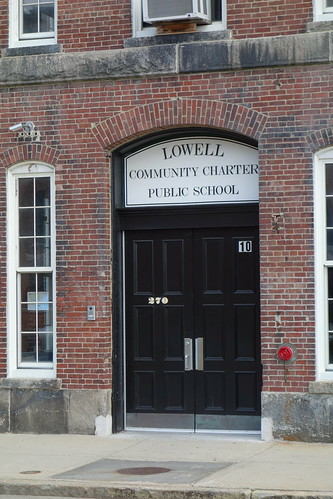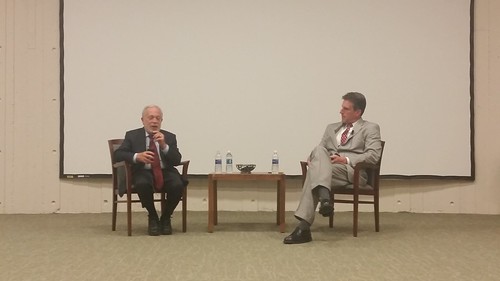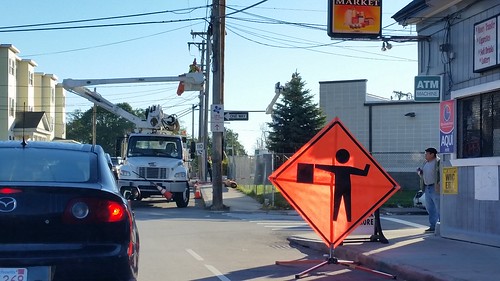Lowell Week in Review: October 9, 2016

Lowell Community Charter Public School on Jackson St
Charter School Cost to Lowell
A few weeks ago, Mayor Ed Kennedy requested the City Auditor provide an analysis of the financial impact of Charter Schools on the city. This week’s City Council packet contains that report. It explains that the state charges Lowell based on a complex formula for each “fulltime equivalent” student who resides in the city and who attends a charter school. Auditor Bryan Perry explains
“As the assessment against the city for the Charter School Tuition continues to climb, the reimbursement back to the city remains relatively stagnant. This has caused a drastic spike in the city’s obligation for Charter Schools.”
A chart in the report shows this for the past three fiscal years:
FY15
Charter School Assessment – $15,711,838
State reimbursement to city – $3,157,308
Net city obligation – $12,554,530
FY16
Charter School Assessment – $18,313,404
State reimbursement to city – $3,454,216
Net city obligation – $14,859,188
FY17
Charter School Assessment – $20,356,791
State reimbursement to city – $3,356,791
Net city obligation – $16,977,864
The chart certainly corroborates the auditor’s statement that while the assessment against the city climbs, “the reimbursement back to the city remains relatively stagnant.” Lest anyone be confused, the increased amount assessed to the city comes out of the city budget, specifically that portion of the budget that would otherwise go to traditional public schools, and the state reimbursement comes from the governor and the legislature.
The report also shows which charter schools Lowell student-residents attend:
Lowell Community Charter School – 755 students from Lowell
Lowell Collegiate Charter School – 577 students from Lowell
Innovation Academy (located in Tyngsboro) – 213 students from Lowell
Lowell Middlesex Academy – 104 students from Lowell
Other charter schools – 4 students from Lowell
With a referendum question (Question 2) seeking to raise the cap on the number of charter schools in the state on the ballot in just a few weeks, it will be interesting to see what, if any, comments city councilors make about this report on Tuesday night.
Police Equipment Bonds
On Tuesday the council will also be taking a vote to authorize the $500,000 in bonding authority that was created last year to purchase the Shot Spotter system to be used instead to purchase surveillance cameras and associated hardware and software for the police department. You may recall that Shot Spotter uses directional microphones to identify and detect the location of gunfire within its area of coverage. Council Dan Rourke was the prime advocate of the system at a time when incidents of gunfire happened much more often than they do now. Although the city thoroughly investigated Shot Spotter, there were lingering questions about its long-term cost and utility, so the system was never purchased.
The memo that accompanies this week’s Vote document suggests that adding more video cameras to the city’s existing coverage will help detect crimes of violence, but will also be of use in the city’s efforts to curb illegal drug activity, illegal dumping, and panhandling.
In general, I think video surveillance of public places is a useful tool for solving crimes and prosecuting wrongdoers. As we were reminded this weekend in the Presidential race, video can be very powerful evidence. At the city level, there just needs to be a strong and clear policy to ensure that the resulting video is used for the purpose intended.

Hamilton Canal District
Hamilton Canal District Timeline
In response to motions by Councilors Leary and Samaras in July, and Councilor Belanger last week, the Division of Planning and Development provides the council this week with some anticipated construction dates for some of the projects within the Hamilton Canal District. Here are the highlights:
Lowell Justice Center – Groundbreaking occurred this September; occupancy expected in January 2020;
HCD North Infrastructure (including Signature Bridge) – Groundbreaking scheduled for October 11, 2016; work is to occur from Spring 2017 to Winter 2019;
HCD Parking Garage – Design will occur Winter 2017 to Winter 2018; construction Summer 2018 to Winter 2020;
Genesis Healthcare Building – land acquisition negotiations ongoing. Construction expected to begin Spring 2017 and finish Summer 2019;
Watermark Building – land acquisition negotiations ongoing. Construction expected to begin Spring 2018 and finish Summer 2020;
National Park land swap – Finalizing acquisition of parcels from MBTA for bus parking. Once that’s done, federal Office of Valuation Services will do its assessment to ensure equal value is being obtained in swap. No time stated.
Lord Overpass – Currently in design. When Lowell DPD briefed MassDOT this summer on the “fill in the Overpass” idea presented at the public meeting back in March, a good reaction was received from the state. The project design consultant is finalizing a design that will be presented at another public meeting at a future date. MassDOT plans to begin construction in 2018.

Robert Reich and Jay Ash
Robert Reich and Jay Ash in Lowell
Congratulations to Community Teamwork for bringing former United States Secretary of Labor Robert Reich and current Massachusetts Secretary of Housing and Economic Development Jay Ash to Lowell for the first of its Community Conversations series, this one at UMass Lowell’s O’Leary Library.
Reich, who when reminded of his 2002 campaign for governor of Massachusetts, suggested that had he been able to stay in the race to the end, he could have defeated Shannon O’Brien for the Democratic nomination and went on to beat Mitt Romney in the general election. He then invited listeners to speculate about how events may have turned out differently.
Reich spoke expertly about the forces at work in America today, especially on the effects of economic inequality. Rather than repeat his comments here, I will save them for a separate post in the coming days.
Reich shared the stage with Jay Ash, the former City Manager of Chelsea. Ash described himself as a lifelong Democrat who got his start in politics as a high school volunteer on Ed Markey’s first Congressional campaign (and who still holds Markey in extremely high regard). Ash said he was beyond surprised when Governor-elect Charlie Baker reached out to him with the offer to join his cabinet. He then said he was stunned in the early days of the administration to discover that partisanship didn’t have a role; it was all about improving the quality of government.
In his remarks, Ash gave what amounted to a mini-State of the State address. In his view, it is pretty good (although he did warn that there will be mid-year budget cuts announced soon due to sluggish tax revenue collections.
A couple of items in Ash’s remarks are worth highlighting. He said the future prosperity of Massachusetts rests on innovation, then went on to say that most of the innovation is being driven by our great universities like UMass Lowell which are “key to our economy.”
Ash spent considerable time extolling the virtues of a new program called Work Force Housing which provides state subsidies to developers who build housing that mixes market rate with some lower priced units set aside for those who work but who are still low on the economic ladder. Ash said that the Commonwealth “gains social capital by mixing income groups together.”
This is the very same program that Winn Development proposes using to help construct two new residential buildings within the Hamilton Canal District. When Winn mentioned this in its presentation to the council two weeks ago, some councilors reacted negatively to the idea of having any “affordable” housing in the Hamilton Canal District. Too bad those councilors weren’t present to hear Secretary Ash talk about what an innovative, commendable program this Workforce Housing will be.

Jay Ash post on Twitter about his Lowell visit
Ash, who in his travels around the state always grabs a chocolate frappe from a local establishment, chose Heritage Farms Ice Cream for that honor (see screen shot of Ash tweet above). During the Q&A following his remarks, no one asked Ash why he recently withdrew his name for consideration for the position of Cambridge City Manager. After his impressive performance, several in the crowd speculated quietly that bigger things were in store for Jay Ash. I wouldn’t bet against it.

Replacing telephone poles on Westford St
Double Poles No More?
Complaints about double telephone poles return to the city council chamber with all the frequency of the seasons, but I wonder it that angst might be coming to an end. For the past month, you haven’t been able to drive through the lower Highlands without encountering teams of workers installing new telephone poles. This is not a random pole here and there, but great stretches of poles and many different streets. Councilors will be pleased.
The HCD timeline is a good overview of what we can expect, although it doesn’t include the details that would be needed to follow the progress. For example, the FY ’17 allocated $31.5M to the progress of the Trial Court – but just what does that produce? So far it has been a ground-breaking ceremony. What can we expect in the coming months? If it is nothing more than site preparation and long lead purchases of building materials, we may have to wait until the FY ’18 allocation of funds to see any construction progress.
Is the city’s net obligation on charter schools the money the city would be spending to educate the student that is attending a charter school? What is the state reimbursement to the city? Is that a reimbursement above the city’s net obligation to educate a student? Just trying to understand what these numbers actual represent. Thank you.
Cathy, another question that occurred to me yesterday: is the reimbursement to a city from the state consistent from year to year per student. In other words, do reimbursements decline from year to year for a given student?
How much money are charter schools receiving per student versus traditional public schools? Traditional schools already receive much less money per student than the technical schools do. I see that if more charter schools created and sanctioned, funds will be split between more groups and our schools wont benefit as much from economies of scale.
Aside from the funding issue, we should all consider charter school oversight. There have recently been concerns raised at the Lowell Community Charter School over the “resignation” of their principal. Some charter schools, as I understand it, are private interests. To what elected official(s) are they subjected? Who insures that they are acting in or for the public good?